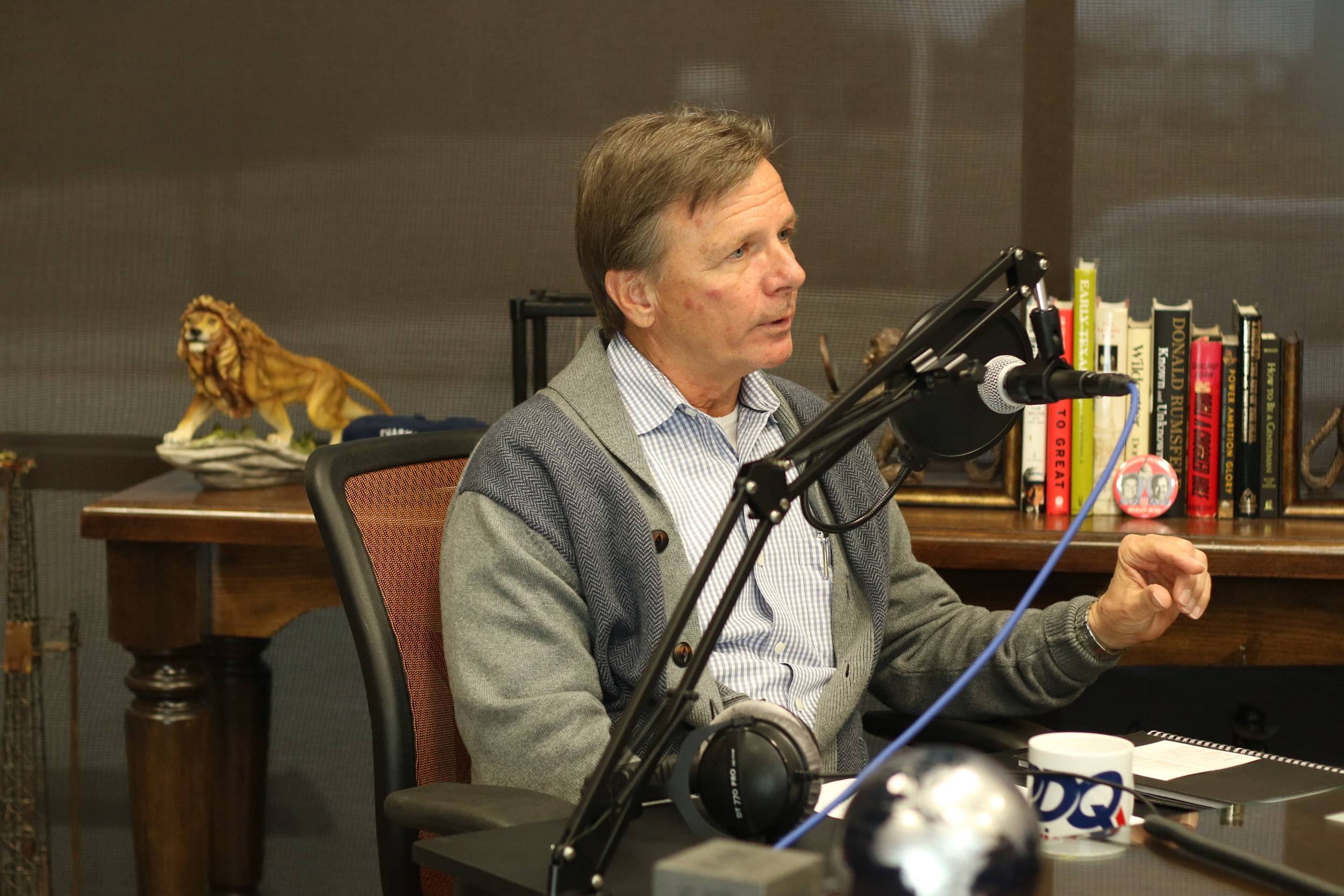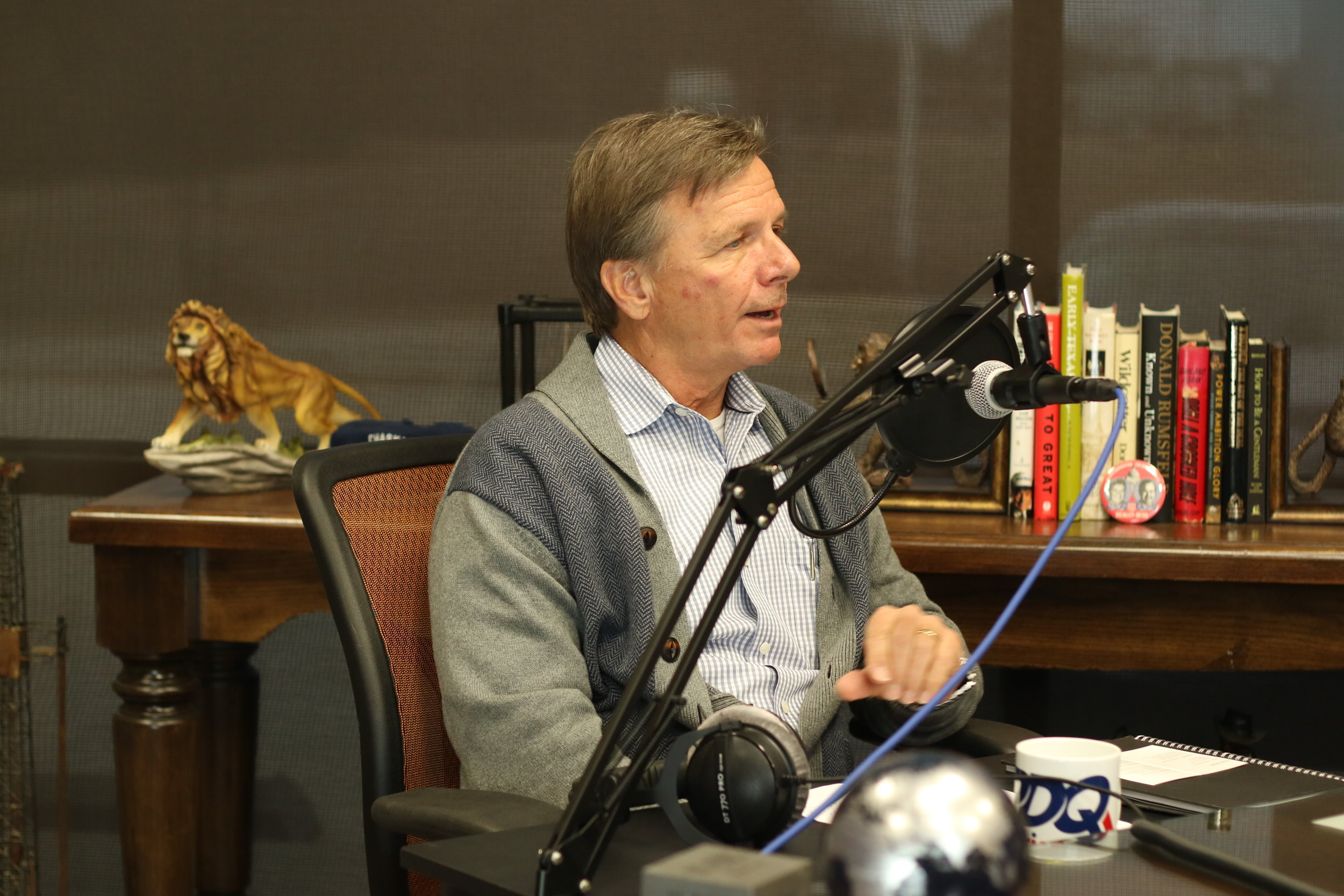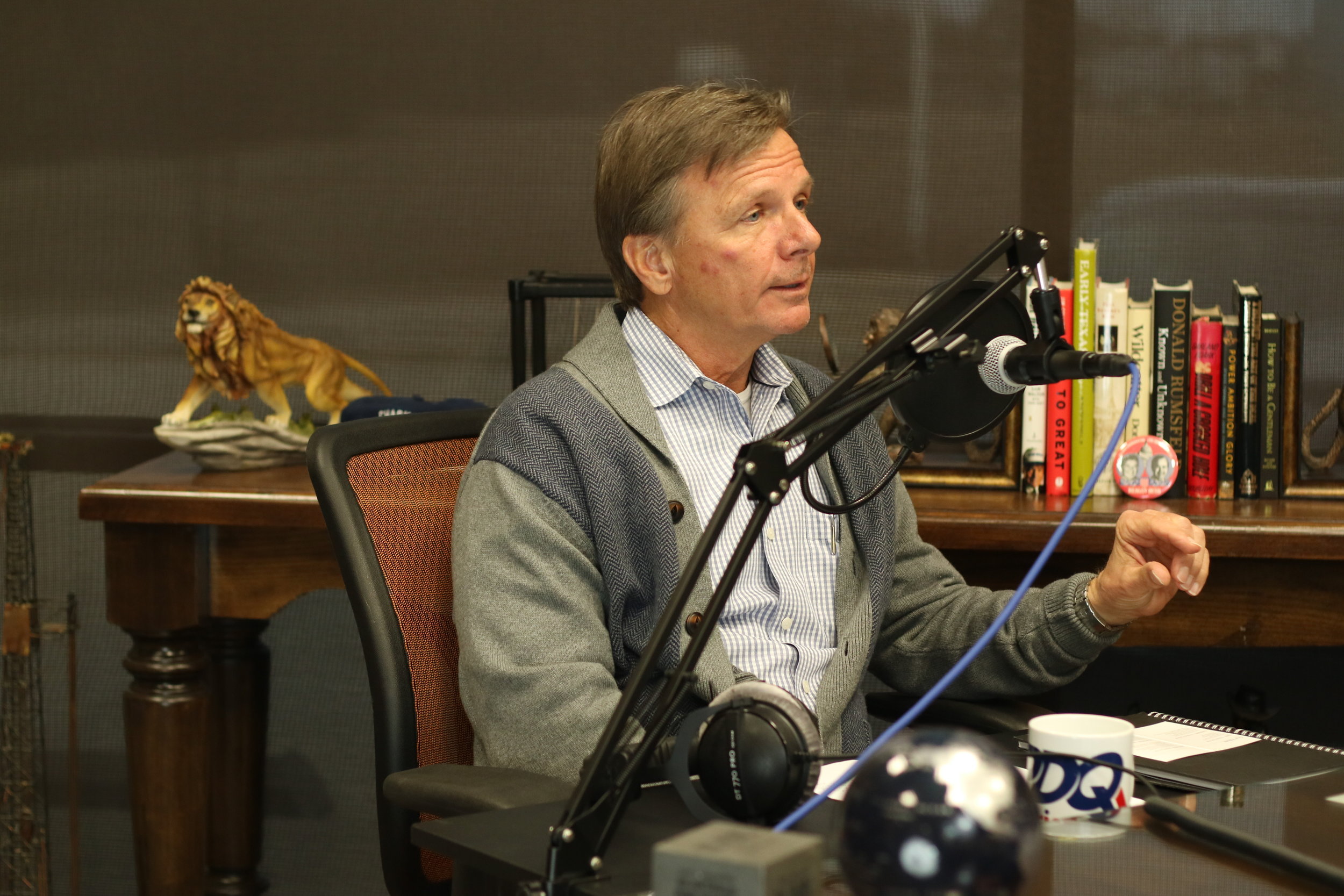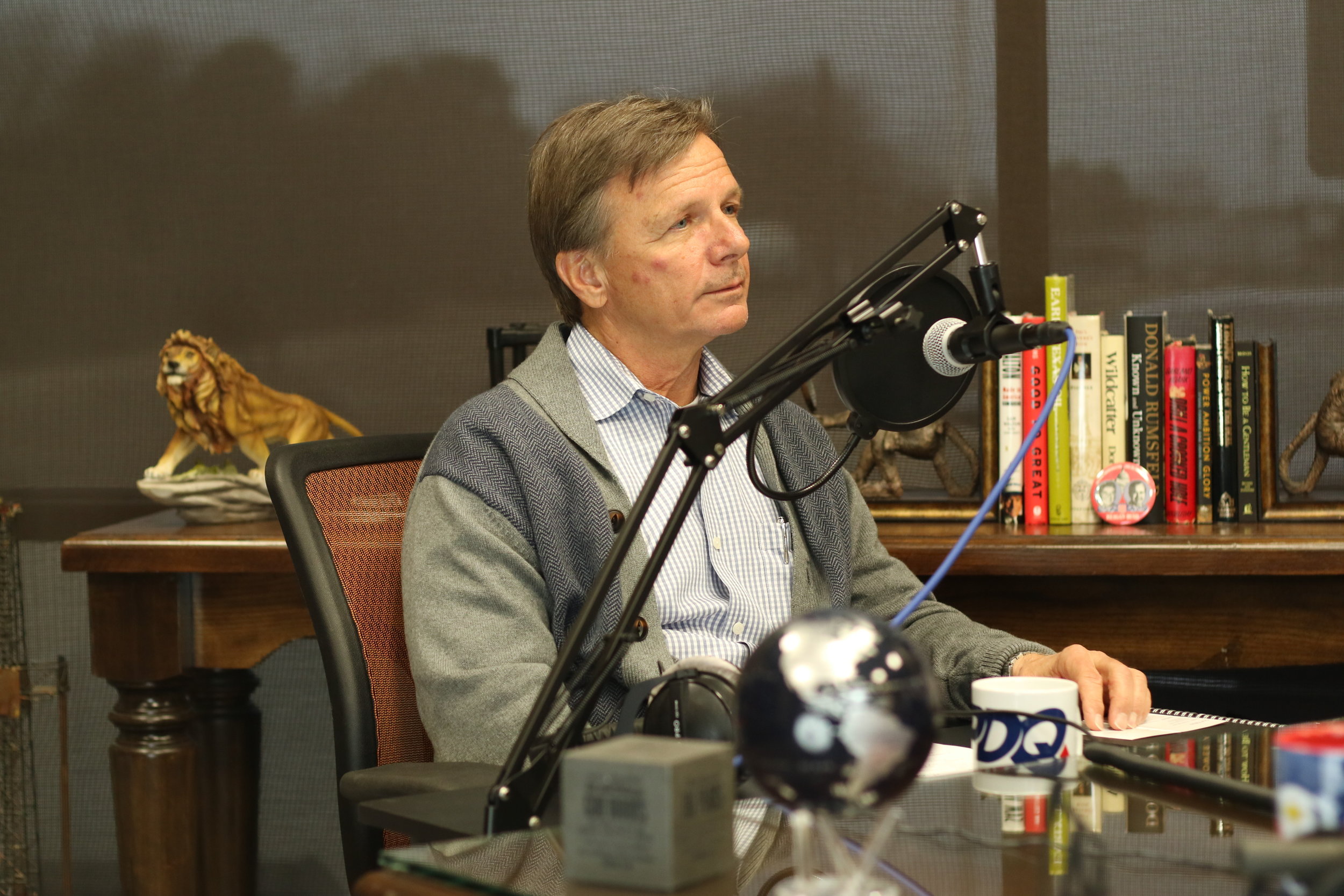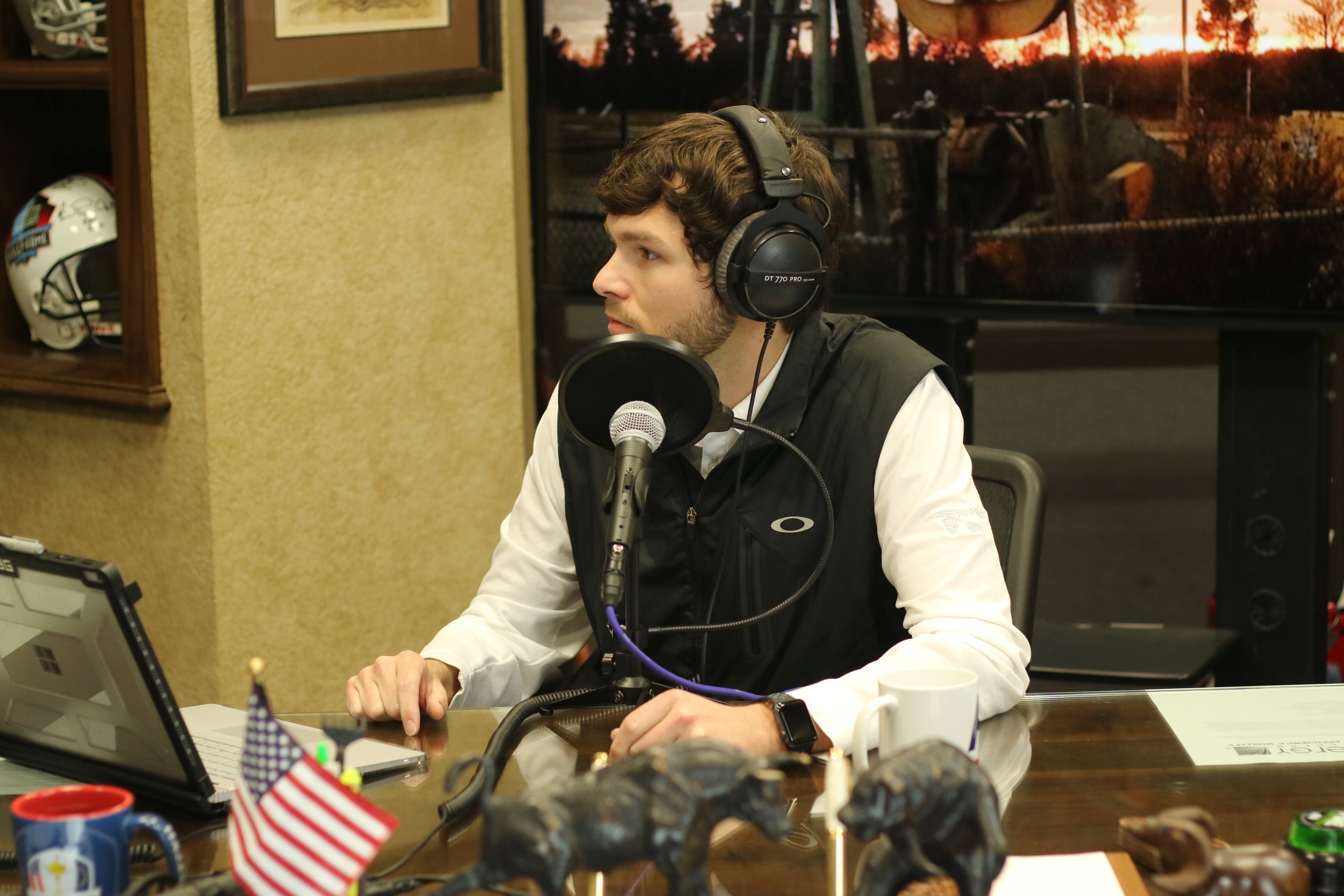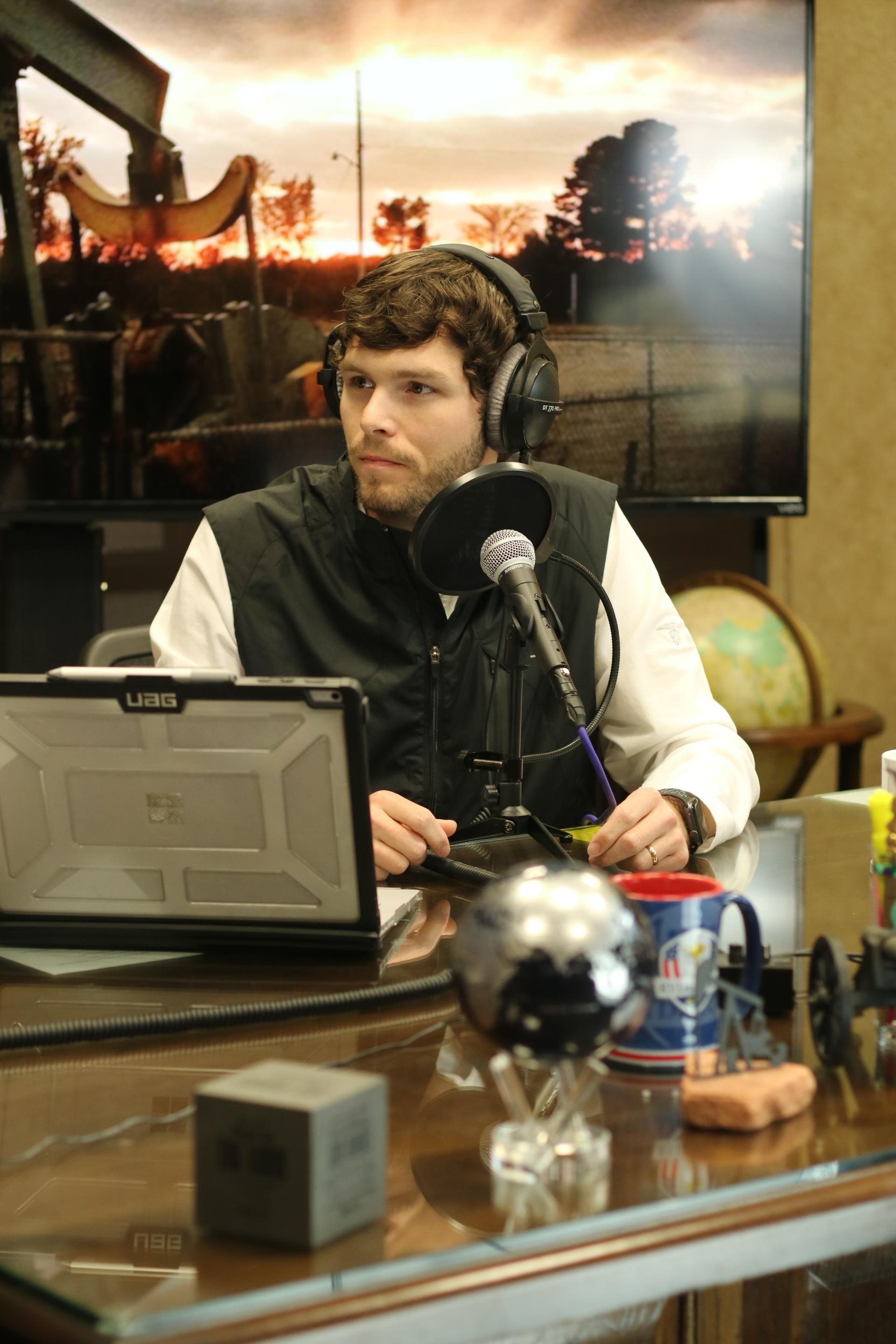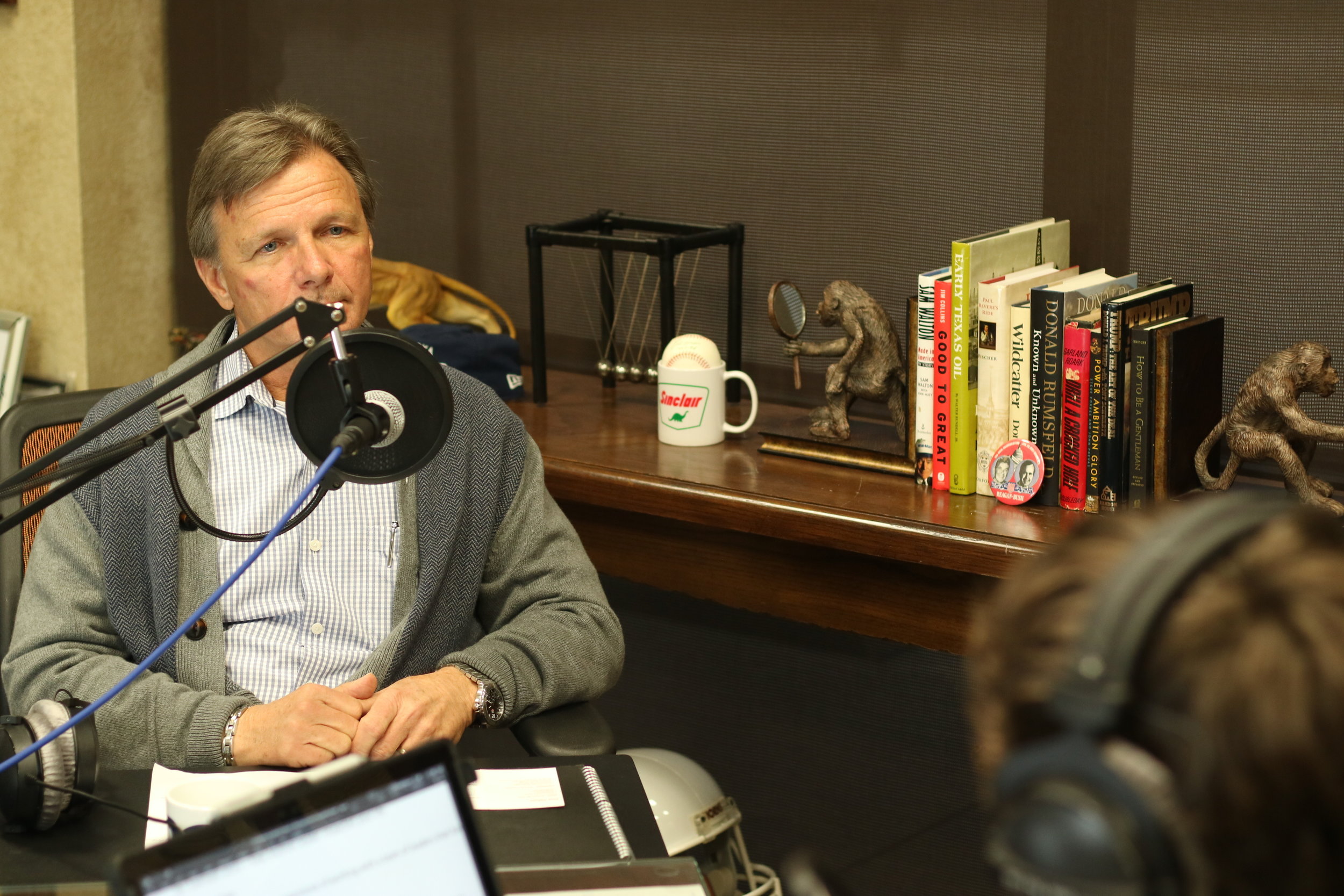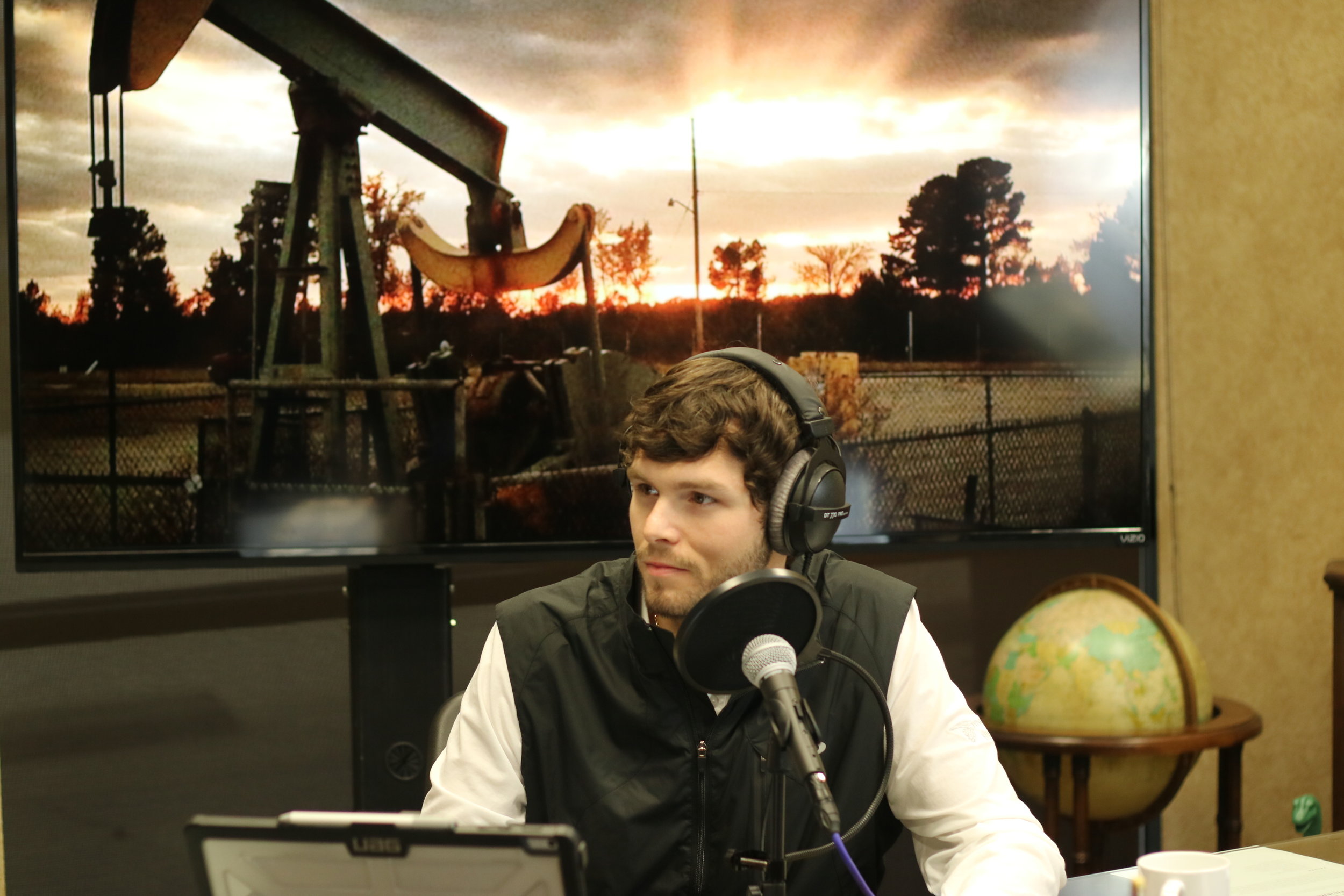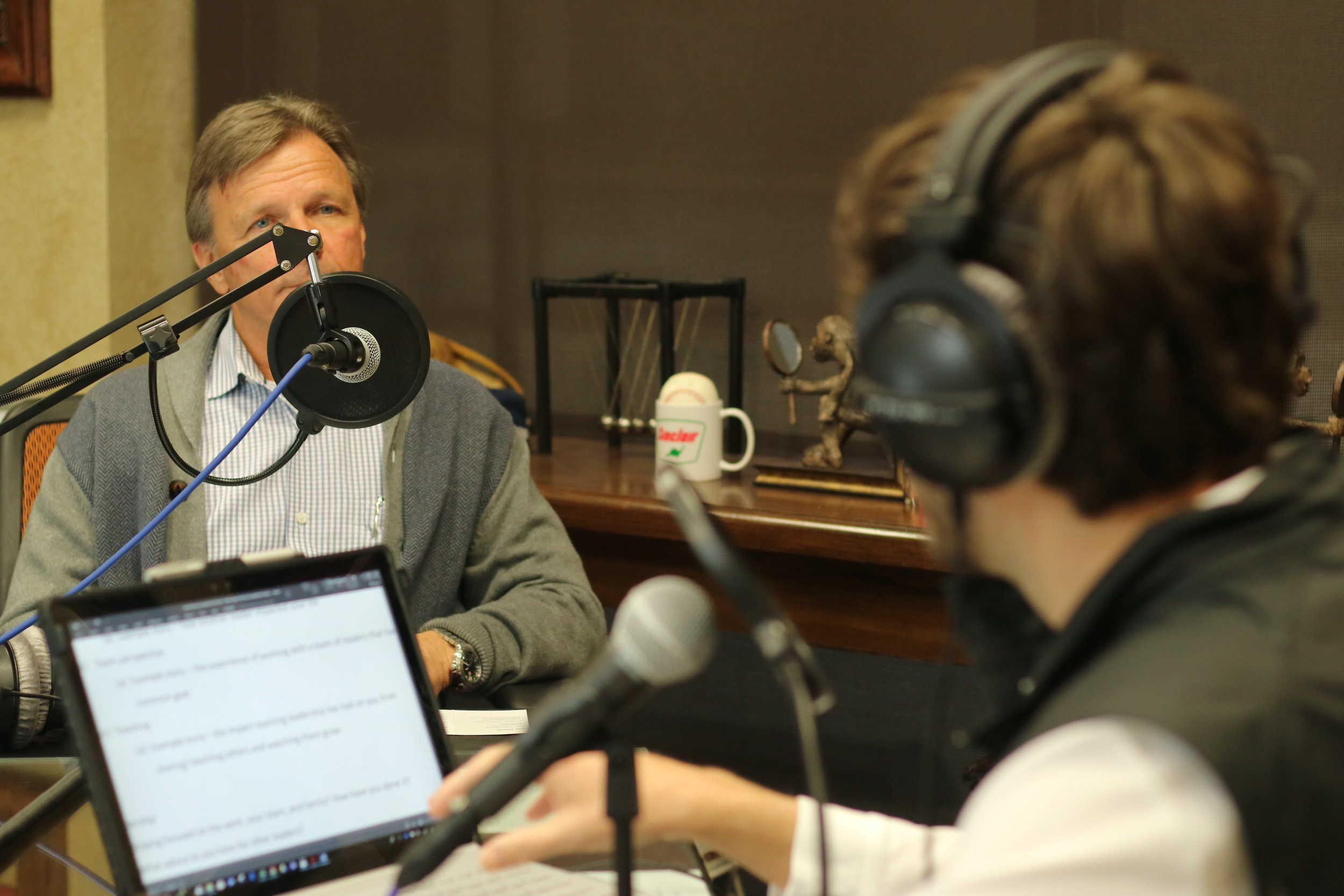Michael and Blake discuss self-discipline, eliminating chaos, being a whole person, keeping your marriage on track and the importance of company mission, vision and values.
Show Episode Transcript
Manufacturing Leadership
Making Of a Great Leader with Blake Gage
Intro:Welcome to manufacturing leadership, a podcast for young professionals in and out of the oil and gas industry. And now here's your host, Energy WeldFab’s Michael Clements.
Michael C.: Hello friends, welcome to manufacturing leadership an oil and gas podcast. I'm your host Michael Clements Jr. and I'm here with good friend Blake Gage, how are you today Blake?
Blake Gage: I'm great Michael, good to be here.
Michael C.: Yes sir, well we're very excited to have you. Whenever we came across the opportunity to get you on the show and to have you in here, got me very excited and to know that we could have a someone who has been in a leadership role, and been around other leaders this seem just extremely awesome and a great opportunity for our show.
Blake Gage: Well you know as a leader, it's always great to be able to share with other people kind of your experiences, and I've had some great mentors in my lifetime. And so for me it's an exciting time to share some of that with you guys, some of the great times we've had, some of the mistakes we've made and I think it's be a great time for both of us.
Michael C.: Well wonderful. Well Blake just getting into your background a little bit you know your faith, family, hobbies, current job, what do you have going on?
Blake Gage: Well faith is always I'm glad you put that first Michael, because clearly faith is the grounding anchor for me. As a Christian in a follower of Christ, that kind of comes first in my life and everything kind of built around that.
My family I've got a wife of 43 years, I've got two children, four grandchildren and they all live close which is really exciting, and as you get older that becomes such an important part of your life. And as far as hobbies I love to go to the gym believe it or not and workout, I like to run, play a little golf its ugly but I enjoy it and that just about takes up all my time.
Michael C.: Yes sir. Well getting into your family, your hobbies, your faith you know keeping all those things balanced, I'm guessing this is something that has been a lifelong journey for you.
Blake Gage: Yes, you know balance is always brought and balance is always difficult as a leader, because I don't know that you can ever have true balance and that you devote so much time to what you do, and to your business and to making it successful. For me that balance has kind of come as a matter of growing actually as a Christian, because you're always evaluating. Am if giving the right amount of time to this, am I given the right amount of time to that and really my faith is what always makes me question where I'm at and what I'm giving.
So that's where that faith comes in, because it's so easy to get it tied up into what you do that becomes more of who you are, and so you really want to make sure that you're a whole person and that whole person means giving time to the things that are really important.
And whether it's your faith, your duty to the community, what you do with your family, your kids, and your grandchildren and oh by the way you're still a leader in your company. So all these things have to happen in balance, I don't know that can ever be achieved, but I know that's something you always strive for as a leader.
Michael C.: Yes sir. Well and our ability to balance really goes, coincides with our ability to be a good leader in our organizations. And it seems like at times if one of those gets off it does impact one of the other one, so having that way to ground yourself and being able to rely on your faith and to rely on Christ in those situations I think is vital, I couldn't imagine trying to be a leader without that.
Blake Gage: Well it's easy to get off the track, and typically I think in a marriage probably the marriage is the first thing to get off the track, because you become comfortable with each other and sometimes you ignore the most important person in your life is the person that you're married to.
So that is always going to be kind of something you have to evaluate and just work at it, and I think the whole thing is recognizing that that is an issue, and once you recognize that it is an issue you will come back on the track if you're thinking through those issues.
Michael C.: Yes sir. Well getting into your job history, what was your first job?
Blake Gage: Oh my gosh, boy we're going a long way back from my first job. Actually my first job that I can remember having was when I was in junior high school at Brookshire's, and so it began to teach me what customer service looked like, how you're supposed to do it.
Brookshire's is actually a great training ground for young people to say this is how we build customer loyalty. So even though I wasn't there a long time, that was clearly the first experience I had with working for somebody really for a paycheck, other than cutting yards and doing the things that you do as a young man, that's really not a company oriented.
Michael C.: Yes sir. And you touched on that you were able to learn and I'm sure there were a lot of lessons that went along with that, that first job it always seems like you know it's a tough one, you're just trying to learn how to work, trying to learn how to I knew for myself how do I just make sure no one's getting onto me or make sure I'm doing the right thing. Is there any story you can remember earlier in your career, maybe at Brookshire's or after that that really you can look back on now and say that shaped me?
Blake Gage: Oh I think so many of all your experiences shape you, all of my work experience has shaped me. As a young man trying to trying to balance work time versus play time, because the tendency is want to have all play time. And understanding that if you're going to do this you have to have money, and you have to work for a living. So it is that first experience I guess that you go and go okay I can't have it all, I have to figure out how I'm going to finance my fund, and of course as you get older it becomes a whole different set of priorities and a whole different set of goals.
But initially starting out I think it's just learning a little bit of self-discipline, and sometimes again that's one of those things that you never hit totally on, but self-discipline is probably the greatest thing that I've learned from my first job even going forward, is understanding everything's about priorities and self-discipline and learning how to do a quality job, and having somebody set expectations for you.
Michael C.: Yes, that's self-discipline I think that's a wonderful point you bring up, and for leaders you have to be disciplined because if you're not disciplined the ones that are you're working with why would you expect them to be disciplined as well.
Blake Gage: Yes, you know because really one of the things that we've learned through my business life is confusion causes chaos and so discipline cuts down confusion, and which cuts down the chaos which is what you don't want at work is chaos.
So I think as you become more disciplined you really kind of begin to set a standard for everybody who's following you, and it's hard to follow if they don't know where you're going. And so having some self-discipline and cutting down on confusion, I think one of the leader’s main job is to cut down on confusion.
Michael C.: You know looking at that early job history and those things, when did you come into your first leadership role?
Blake Gage: Well you know it's really interesting because I was in a sales role, and I was in Houston Texas and gosh this is 30 years ago. And I had some time to kill before an appointment, and I actually walked into a bookstore and I picked up a book on leadership. I had no idea, I didn't even know if the topic really interested me, but as it turned out the more I read the more leadership became a goal for me and to get better at it, and to learn it and what cost it to happen.
And as I got further into my career it became kind of an obsession, is what makes a great leader, how does that happen, are you a born leader, is it training, what is it that makes you a great leader? And so I kind of immerse myself in it, and while you're never perfect at it you begin to grow and learn and see things that do help you to become a better leader.
Michael C.: As you're growing in your leadership and you start to learn that, that had to have a great impact on you. And that kind of brings a point to mind is that managers need to be leaders, but leaders don't always have to be managers, a leader can be at any role it can be any position. You're the leader of your household, you can be a leader of an organization, you can be a leader of a Sunday-school class there's many different aspects of life where leadership is required.
And I think that's one of the neat things about our show is that it doesn't necessarily; you don't have to be in a management or executive position to have good leadership ability. I think back to being a child and playing sports, naturally some of us were just drawn to being a leader on a team. I can remember everybody coming back into the dugout hey high five here, high five there, hey let's get the bats going.
I think it does start off early in life and for myself I kind of found the same, I picked up a book, I learned more about it which we luckily enough in Texas Wesleyan I got to experience leadership classes, which when I started learning about that it really kind of got to a point where I was like hey this is what I want to know more about. And through the years here at Energy that's been a focus of mine is to learn how to get better, and boy if I had those ups and downs but you're constantly working on it, and I think if you can be seeking out wisdom, if you can seek out others that plays right into that role of you being a leader and also being humble enough to know I got to get better at this.
Blake Gage: Yes, I truly believe that if you try to really boil leadership down its basically influencing behavior. And to your point, you may not have the position, but that doesn't mean that you're not a leader. We've all seen companies where the guy doesn't have the title, he's not a vice president or he's not even a manager, he's not even anything to a large degree but he's an unvalued employees and you realize that other people are following him, not based on his position, based on his influence.
So leadership can't be confused with titles, because we have a lot of leaders in every company I've been a part of, and they don't always have titles. And matter of fact most of the time they don't have a title, but they are able to influence others, not to mention your family, you know as you grow up you have kids, you have grandchildren, you're clearly the leader and by leadership it means you're influencing behavior. So I think leadership needs to be defined for all of us as influencing behavior of others.
Michael C.: Yes sir. Well and from an individual perspective, how has another leader impacted your life?
Blake Gage: Oh man I tell you, in fact one of the reasons that I'm so immersed in it now is I began to see guys that that were leaders, and I just wanted to say what makes them tick, how do they think, what is it that makes them different. And so I had a lot of bosses, supervisors through the years some good, some bad but the really good ones I have learned something from every one of them.
And so when you take all those things that you've learned and you combine them together, you get this picture of what you want to be as a leader. So I've had some leaders that were good at one thing and not good at another, and so as my career developed I go you know what I'm going to pull this, and I'm going to pull this, I'm going to pull this from these guys, I don't have to have everything but I'm going to learn through my experience, what are the things that I admire. And then I'm going to try to garner some of that, I'm going to try to take some of that and learn some of that and use it as my skill develops.
Michael C.: Was there any specific skill early on in your career that you knew you needed to improve on, or that you were striving to get better at?
Blake Gage: You know the more I do it, actually the more I learn things that I need to improve on. And I love people, and I love to help people and so for me as a leader sometimes my biggest gap in my leadership is holding people accountable. And that sounds like such a simple thing to do, but I can tell you from the many years that I've been a vice-president, that I've done different things, part of the biggest struggle that I've had is managers not given honesty to their people.
And in evaluations we've learn a number of times where employee is evaluated at an eight or a nine on a scale of one to ten, and then come to find out that the reason they are evaluated so high is because their leader was not honest with them. So learning to be honest with people about their performance and holding them accountable is one of the greatest traits that a leader can have, and one that I have had to really work at over the years is more to be respected than to be liked.
Michael C.: Yes, I think that is very good especially for young leaders to hear that, especially myself. That is something you can struggle with early on, and I think that the fact that hearing you say that and that it's something you're always are kind of going to battle with at times if that is something that you need to improve on or you know you need to get better at.
Blake Gage: It's a hard skill because we all like to be liked, and a lot of us come out of the sales part of a program. So in sales that's just that's what you do, you have to be liked, people have to trust you and they have to like who you are to want to do business with you.
And I think as you grow in leadership and managing you have to really think yes I want to be liked, but there's something more important to be respected, and to set goals and to set a vision and to hold people accountable to make them better.
Michael C.: Yes taking on that responsibility, if your prerogative is for people to like you, that's really going to be a tough thing for you to do as a leader, especially when you have the responsibility of others. And I know the organizations that you've been with, there's a lot of people depending on the decisions you're making and if you're not holding yourself accountable or others that can be a, I guess that could get off track really.
Blake Gage: Well what happens Michael is when you don't do that is when mediocrity sets in, and because what happens is you begin to let expectations slip, and people watch that. And so as you let expectations slip, all of a sudden this great organization becomes just another organization.
So it's really important to the organization and to the individual that you set expectations and you hold people accountable and you don't settle for mediocrity, and that's kind of the definition of success.
Michael C.: Yes sir. What have you found is a good tool to get better at holding others accountable?
Blake Gage: Well I think it's always good to build relationship capacity with people that work for you, and what I found is because I have a tendency to want people to like me I build a relationship capacity with people, I do that very well that's one of the things I do well. And so as I build that capacity, I find it's easier for me to be honest with them and point out gaps in their performance, because most people want to do the right thing, most people want to be successful, but if we're not honest with them they can't operate at a high level.
And so building a relationship capacity with me, helps me to help them. So I don't know if that makes sense or not, but the more I get to know people and work to get to understand them, the easier it is for me to not criticize them but criticize their performance, so that they can improve and the organization gets better.
Michael C.: And the trust has to become much more better when you do that relationship building versus just hey, we got to hold you accountable but hey you've built that relationship with them, they're going to grow to trust you and therefore whenever you they see hey, Lakes trying to lead me in a new direction, they're going to have faith in that.
Blake Gage: Well I think people have to know that you care, and so relationship capacity all that is, is saying to that individual I do care, I care enough to hold you accountable.
And so people have to know you care or other they say people have to know how much you care before they care how much you know, and so I think that's a real big piece of it, is really building that relationship capacity with them.
Michael C.: I think that's extremely helpful Blake.
Blake Gage: Thank you.
Michael C.: Well Blake moving on, from the team perspective I've gotten to know some of your team members and being around you all, you all have an exceptional team by the way.
Blake Gage: Thank you.
Michael C.: Wonderful team. And Blake can you just give us maybe a little background on the team you've been with?
Blake Gage: Sure, we've been really blessed; we work for our CEO James Archer. Just a wonderful guy to work for and work with, he's a great visionary. And so I started out with James at Multi Cam and a number of years there I was over at HR and HSE and different functions, fleet and watching him lead the organization has been really amazing. We sold Multi Cam to Halliburton in 2011, and we really have two other companies that were then working with James on now, the first one is KJ Energy, and we've went from the service side to be in production guys.
So it's kind of a new experience for us, but love, the production piece of it, drilling and fracking and all the things that are about production. And then James has a music company in Nashville called MV2 entertainment, so we go from oil and gas to Nashville and entertainment, it's as much fun as you can have without getting arrested. So it's been a blast for us, and that what's happened is that a lot of the team that was part of Multi Cam is now part of KJ energy and also part of MV2. So now we have a history of being working with the same leadership team, which makes you better and better as long as you're all working on your constraints.
And we talk about constraints some and those teams, and the team meetings and so we have a lot of relationship capacity. So we're very honest with each other sometimes to a fault maybe, but at the end of the day what makes it so much fun is you trust each other. There's nobody out to do anything but make the organization better, so while we may disagree on how to do it, at the end of the day when we get finished up and we all go home we love each other as brothers, and it's just been a been an amazing experience for us and continues to be.
Michael C.: As a young leader in getting the opportunity to be around you all and I haven't been around you all necessarily at working or doing those things. But just in your private lives and being able to be around eating dinner and doing those things, there's just a certain rule whenever you all are together, and everybody hey I Love You Man, your passing out hugs that is just a tremendous environment to be around. And you all really, for another leader looking in you see something like that you're saying wow how do I put that in my organization, how do I do that with my team.
And it really it's something to look up to, and it's something very valuable that you all have. And I really like the idea you know we've discussed it a little bit, is the fact that you all are in Nashville, you're on the production side of things, but you're taking that same leadership model and that same approach, you're not having to change up your principles, you're not having to change up what made you great to try to do it in another industry. You're taking that same belief system, and in a sense replicating it and you all have already seen how it can impact and still be successful no matter what it is you're doing.
Blake Gage: Well the mission, vision and values and I know you guys are really intent upon your mission, vision values. But what you find out is if you're really sincere about your mission, vision, values. Our mission, vision, values are not exactly the same at MV2 as they are at KJ energy, but you could overlay them and they're the same important principles that we've always learned. You know respecting each other, collaboration, excellence all those things transcend any one industry.
So it was really unique for us to get into the entertainment industry, and realize that you know what it's still people, we are all in the people business whether we're production, whether we're cutting a song, it's the people business. And people like to have values, they like to understand what behavior is going to make them successful, and so what we try to do is no matter what business it is let's set the standard, let's develop our values, let's hold everybody accountable.
And what you find is you will draw people who love those values will want to come into your organization, and so that's been a cool thing for us, is we've done it enough now that all of the people in our organization we would like to think and we've seen where they buy into the values.
Michael C.: How has that impacted individuals in the entertainment industry, have you all seen that, is that something that a lot of companies were already doing in the industry? How are people in the entertainment industry accepting that approach?
Blake Gage: Well it has been really unique because we looked around at all of the publishing companies that were around there, we could only find one other company that even showed their mission, vision, values. So we just said look we don't want to be just another company, we develop our mission, vision, values we hold to them and we are attracting some really neat people.
So what we found is somebody might think well if you have these values and this is the standard, it might scare people away, well in reality what we find is it draws people, it draws the right people. We've had a number of people said hey, I was looking at your website and I saw your values and I want to be part of that.
So it's been really a pleasant thing for us and although it doesn't mean the other companies don't have value, it just means that we hold ours as our standard, we preach them, we try to hire to them and we let people know these are our values and you can behave yourself in and you can behave yourself out. So it kind of becomes a way to keep people out of the ditch, because now they know, these are the things that will help make me successful here.
Michael C.: James told me one time we were having a conversation, this is probably three or four years ago. And he had made the point that whenever you're in a multinational or international company, that a lot of decisions are being made on a daily basis that it's impossible to have your hand over each one.
And what he told me was the tool where those values of the company, and that if you could answer yes and yes I'm following all of the values here and this decision then you don't have to go ask the CEO, you don't have to ask another one of the executives in the company, you just made your decision.
And I thought that was so unique how he explained that to me, and it really hit home with me that hey, values are very important and it's not just on your website or something you put out there good for marketing it really is more than that, it's the whole basis of your organization if you let it.
Blake Gage: Well one of the things that we've done quite often is, if we have an issue and we do have issues like every other company, we can set that employee down and say this are our values, can you tell me what you did, did it fit the values? And they know, I mean they know if something that they've done was incorrect or wrong or not aligned with the values, you have those values in front of them and you can say hey, it's this thing that you did does it align with our values and they know.
And so it's a behavior correction tool, it also is a guide for us in our hiring. So we think the values and our experience has been, the values that are guiding life for us that helps people understand acceptable behavior.
Michael C.: And earlier you'd spoke about discipline that values that helps instill that discipline at an organization, very important to that.
And going back to your point as well about whenever you're able to sit somebody down and talk about the values, did you see that that's a much more positive approach than say telling them how you did wrong, and you don't give them any way to get out of it? That could be the really bad thing if a leader is doing it in that manner. So I guess how do the values help instill that discipline?
Blake Gage: Well I think there's a couple of things I would say about that, number one is there is such thing as truth, truth is what truth is and so there is truth, there's a right way, there's a wrong way that's truth. There's also grace, and grace is not beating people up when they've made a mistake, grace is pointing out the mistake how it doesn't fit the values.
And a lot of time we give a lot of grace, because people make mistakes, we're not overly concerned that a person made a mistake, unless it's one that would really go against the big things of respect and honesty and ethics, and so if it doesn't hit the ethics meter, a lot of times it's just something we'd give them grace for, but having said that we do hold them accountable.
So truth is there, these are the values, this is the truth for our company and then there is grace, and a lot of times we have to give people grace because we needed ourselves.
Michael C.: Our number eight value at energy is maintain consistent accountability, and it's vital to an organization. And if you can go back to that, I found it to be a terrific tool with other leaders in the organization that if someone in their department is failing, or someone isn't getting the job done.
How are you approaching it as a leader? I tend to take the approach that hey, if something's not going right and there's multiple people in our department, you know is it all these different individuals or is it the leader of those individuals, and if you know they're a good leader maybe they're going through something, maybe there's something going on. But you got to be able to go back to something and say hey, are we maintaining consistent accountability in this department, do we have number four value open communication is essential, are we communicating with our team members.
And when you can take that approach, it allows I think it gives a leader an ability of tact and you have something that you can use, it's a terrific tool for teaching and not only growing yourself, but growing your organization, growing your other team members and growing everybody all the way from any position in the company.
Blake Gage: Well just remember values always cut both ways, and why a lot of teams don't I think why they don't focus on values is because management and upper management doesn't want to be held accountable for them. So in our organizations it doesn't matter what your title is, James Archer who owns the company and is our CEO is accountable to the values. So as an organization you have to be able to go all the way to the top, you can't say everybody's held to the values except for.
And so as a senior manager, a vice president, whatever your job is that accountability doesn't disappear at a certain rank. So some companies are scared of that, because they want their people to have a different set of values than they hold themselves, and that doesn't work.
Michael C.: For someone out there in an organization that says I'm hearing this right now, maybe I don't like the way I'm being led.
How do you approach another leader in your organization, maybe even someone that's above you in the hierarchy of the organization that hey, I don't see that this individual is holding themselves to the same set of values. How do you approach something like that?
Blake Gage: Well I mean that's a great question and a difficult one to answer, I think the main thing is I'm going to go back to a word I used is relationship capacity, especially when you're going above where you're at is people really need to understand not only the truth, but they really need to understand that you're doing it for the right reasons.
So I think having enough relationship capacity inside an organization whether you're going up the chain or down the chain, is the ability to confront people in a loving way and in a concerned way without judging it. But just saying look this is our values, this is the ones you talk about, this is what I'm seeing, how does that align? And if you're really committed to it as a company, they should be able to question that.
And sometimes it's really difficult as a leader when somebody comes to you and says I don't think you're following our values in this decision, and that's when you have to make sure that your pride doesn't get in the way of doing the right thing for the organization.
Michael C.: So maintaining that credibility with leaders and others that are maybe higher in the hierarchy is higher than us, there's something that just comes to mind for me is leaders are very quick to, doesn't matter what capacity and leaders it's just natural, they take criticism, like criticism comes to people that are leading. So if you're doing something there's going to be people out there that are going to be critical, it doesn't matter how good of a job you're doing.
And I think that touching on that point I think there's something that leaders need encouragement too, and you hear criticism all the time, when you're at the top of that and you're saying hey, we're trying to get this accomplished, we're trying to do this now, we need to be moving forward well at times the team can say are we moving in the right direction, or is this going right and even though everybody's on board there's still sometimes those doubts in our minds.
Is the leader taking us where we need to go? Am I taking my team where I need to go? I want to stress that I think it's very important that we're also encouraging our leaders, I think that's another trait of a good leader is that you can offer encouragement, it doesn't have to be necessarily to someone that you're managing, but also maybe the individual that's managing you.
Blake Gage: Well you know that's true, and the higher, the further you get up in the organization actually the less encouragement that you get, and people just assume you're the boss you don't need it. And I understand that, and clearly you can't be at the top and have to have it, but all of us if you've got a great leader you want to encourage them, they do need encouragement, they're not oblivious to the criticism, they feel it and many times it hurts them. I think leaders have to be careful that they don't make themselves too vulnerable to criticism, because it's just part of the package.
So those of us who love our leaders we need to encourage them, I called my pastor two days ago and I didn't need anything, I just called his cell phone and said don't call me back, I'm just calling you to tell you that I love you, care for you, you're doing a great job, if you need me call me and that was all. So I try to practice it, because we really do, everybody can use that every once in a while, it's just important that you encourage those who are responsible for so much that goes on.
Michael C.: Yes sir. One of our values is encouragement develops confidence, and there's nothing better than whenever you have a confident leader.
Blake Gage: Yes, all of us like the confidence, all of us like to know that the leaders got it all under control. But as a leader and somebody who's had some great leaders, there's always got to be a little bit of that am I going exactly the right way, and that's when you have to really listen.
Leaders need to be sure of where they're going, they need to be confident of their vision but that doesn't mean they can't listen and it doesn't mean they can't make adjustments, and that doesn't mean that they know everything. So I think great leaders while they are very confident and they have a vision, really great leaders are also able to take things and advice and things people who've done things before, and maybe adjust or tweak something and make it better.
Michael C.: And from your perspective, Blake you're successful, you've been on a successful team, you've been able to be shaped by other leaders, you've been able to shape others. Where you're at in your career, how is it as a leader now to be impacting other leaders and I've had the privilege to learn a lot from you just in our conversations this week and today. What does that impact like on you as a leader now to know that you're helping others?
Blake Gage: It's just a lot of fun, there's a lot of contentment that comes from being able to direct younger folks in their skill sets. I mean we often hear experience is the best teacher; actually someone else's experience is the best teacher.
And so all my experiences whether they're good or bad, things that I've just messed up terribly bad and there are a number of those things, I've learned from those. And so when I talk to other leaders, young leaders I go you know you don't have to experience all the downsides, let me tell you what happened to me when this happened.
And so if I can share that with somebody, and they can use that to make their organizations or themselves better, it's really a lot of fun because you begin to change as you kind of wind your career down, you really begin to be a little more reflective and go okay, what's my legacy, where's my legacy going, what do I want it to be. And it's not going to be how much money you had or how much money you made or, it's really going to be what impact have I had on others right because leadership is influencing others behavior.
So I think the thing for me is I want to be able to look back and not at what you might have gained materially, really to look back and say how much influence have I had that is going to get carried on to the next guy, and then he's going to carry it on to the next one, and he's going to carry on to the next one. And so it's just kind of this cool thing where it's called the multiplication effect, so if I can teach you something and then you can teach to others and then those two can teach to others, you see the multiplication effect of that.
Michael C.: That's wonderful. Our preacher at our church our mission is worship, reach, equip and he's really implementing that same strategy. He finds individuals that he believes could be good leaders, and he mentors them because he knows its discipleship.
If I can teach this individual ought to be a good Christian leader, I can then pass that along and they'll pass that along and it multiplies, a multiplication effect and that's really encouraging to hear that Blake.
Blake Gage: Well you know you think about as believers you think about how Christ did it right with twelve misfits to start with, and he disciplined them and he mentored them and they mentored somebody else, and this is what we do, and so it works a lot on my same principle.
Michael C.: Well and speaking to our listeners out there, is there ever an age that you should give up on saying maybe I should be a leader, or maybe I should start looking at being more of a leader in whatever it is I'm doing?
Blake Gage: I think it's interesting to me, leadership is like golf as terrible as that sounds, and you never become a perfect golfer. If you're a bowler you can bow 300 and you got a perfect gang, if you're a golfer I don't think there is that perfect game, and that's kind of how leadership is. You struggle, and you hit one out in the woods and you learn from it and there's never that game where you go if I could have just got those three putts, so that's leadership.
And so it doesn't matter where 25 and doing it or you're 65 and doing it, there's always a part of that game that you can get better at, and I think we could have a whole topic on self-awareness, because I think that's when a lot of leaders miss it, is they get to the point where they don't have self-awareness, and so they feel like they've made it, but as long as you have some self-awareness, you will see things that you can improve upon.
Michael C.: That's wonderful. I get the feeling as a leader you got to constantly be improving, and maybe that's just the pressure that sometimes we put on ourselves, but when you know there's others relying on you, you know that your decision-making at times it could be improved, you got to take responsibility that and understand hey how can I get better.
And for someone out there that says well maybe I'm not a leader today, but maybe you're 40 years old and you're saying I've always wanted to be an entrepreneur or start a company, but I don't know how or I don't know how I would do this or that, I think a lot of it is just taking that leap of faith. I think that great leaders are made every day, and there's so much information out there now that can help you become a leader if that isn't a drive you have.
Blake Gage: Well I really think nobody is a born doctor, nobody's a born lawyer, and nobody’s a born leader. And so no matter what age you are or what your background is, there's so much out there that you can learn.
Whether it's John Maxwell or Peter Drucker or any number of great leaders that have a number of books out there that can help teach you the skill set, and then you just have to practice it. And you may not have a bunch of people to practice on, practice at the house, be a better leader at home. That's the great place to start is just be a better leader at home, and those same skill sets apply no matter where you go or what you do.
Michael C.: And if you're in a position that someone is watching you, someone is looking at you, someone is admiring the way you do things, you may not know but you're in a leadership position.
Blake Gage: You are. And what I always tell people is take the good that you see me do and ignore the bad, because there's a mixed bag with all of us, but somebody is watching, somebody wants to see how you handle a situation when it's negative, and I think that's the challenge all of us have is to be consistent in our leadership skills.
Michael C.: How important do you feel like your home life and your relationship with your wife and family, how much has that impacted your ability to be a good leader?
Blake Gage: Well it really says everything I think, if you are successful in business and your family's not successful, and what I mean by successful is do your kids feel loved, does your wife feel loved, do they feel like they got nurtured, did you take your family in the right direction so that maybe financially they feel like they've been taken care of.
All of those things are leadership, and leadership really does start at home. Most of us are leaders at home before leaders in companies, and so you know it's a great place to build, it's a great place to think about it and it transfers, it really does. So leading that home is the first opportunity for many of us to develop that skill set.
Michael C.: And that's terrific Blake that really is. As we start to draw to a close here, what advice do you have for other leaders out there? I know that's a big question.
Blake Gage: I don't have a lot of sage advice honestly, but what I will say is based on my experience is to understand that God's given you some things, he's given you a lot of abilities, and he’s giving you abilities that you never knew you had. And so understand what your strengths are, begin to use them and you'll find that people are drawn to other people who they feel like make them better. And so yes we all fail, yes we all struggle with somethings, but I think my advice is just be yourself number one, and secondly be yourself knowing that you can be a better self, all right.
So this is who I am, and this is this is how I am, but there are things I can do better. And never get to the point where you're content with where you are, because there's always room for improvement. No matter what you do or where you go we can all be better and I think just the desire to be a better person, to be a better leader, to be a better father, to be a better husband all of those things require work and don't be lazy.
Michael C.: Blake that is absolutely awesome, I think that's definitely going to have an impact on myself and impact on our listeners, that's wonderful. Blake I hope that we can we can get together and we can do this again, and we can also dive into some more in depth issues in leadership going forward, and have you back, but this has been a wonderful experience, really enjoyed this today.
Blake Gage: Well thanks Michael, it's been a great experience for me and I appreciate the opportunity. It is one of the things that I think as you mature you look for opportunities to share, and I thank you for the opportunity.
Michael C.: Yes sir. Well for all the listeners out there, if you have a question for myself, if you have a question for Blake you can send those in an email to Podcast@EnergyWeldfab.com also you can check us out at www.EnergyWeldfab.com/podcast.
We're also available on all the social media channels Instagram, Facebook, Twitter at @EnergyWeldFab, so seek us out, find us, if you have any questions we'd love to hear from you, thank you.



